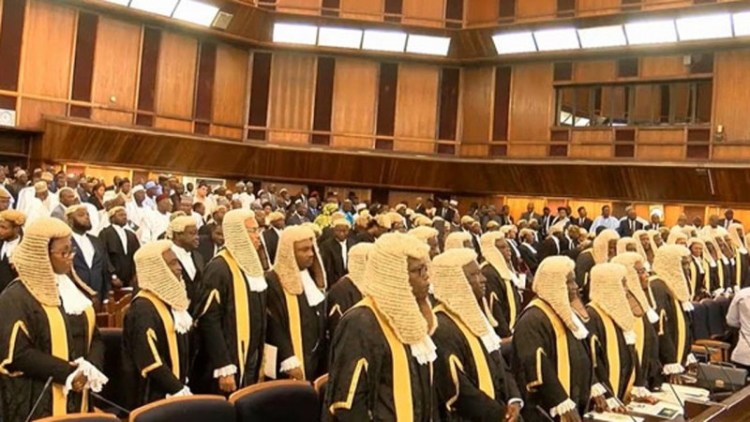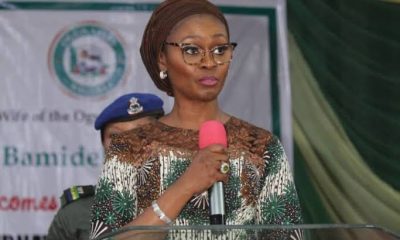News
Stakeholders Call For Review Of NJC’s Role In Judicial Appointments

Stakeholders have advocated for a comprehensive reassessment of the National Judicial Council’s function in fulfilling its mandate concerning appointments to the Superior Court of record.
This is contained in a communique presented by Babatunde Ajibade, SAN, chairman of the Joint Planning Committee at the end of a two-day National Summit on Justice.
The summit, which was themed “Repositioning the Justice Sector in Nigeria: Constitutional, Statutory, and Operational Reforms for Access and Efficiency,” aimed to address key challenges within Nigeria’s justice system.
The stakeholders expressed concern over the fact that the Chief Justice of Nigeria, who is the chairman of the NJC is also the chairman of the Federal Judicial Service Commission, FJSC, the body that initially reviews proposals or lists of candidates by appointment into judicial office.
The summit pointed out the seeming inconsistency between the CJN playing both roles, as it would appear that he is recommending candidates to himself being chairman of both bodies, and being the person who appoints a significant number of the members of both bodies other than those who are statutory members.
There’s a general consensus by the summit on the need to reconstitute or propose reconstitution of both the NJC and the FJSC.
On the role of the State Judicial Service Commission in judicial appointmens, the summit concluded that there was a significant need to ensure that composition of the SJSC is more diverse, that it reflects the interests of the users of the justice sector.
Stakeholders noted the fact that the current NJC guidelines may have subverted the intent of the constitutional provision, empowering the SJSC to make judicial appointments, rather than authorising the SJSC to prepare a shortlist of potential candidates for judicial appointments, appear to address that responsibility solely in the chairman (Chief Judges of States).
Participants also proposed interventions in areas such as human rights protection, fair trial mechanisms, alternative dispute resolution, and technological advancements for a more efficient system.
On funding, budgeting and administration for the judiciary, the summit resolved
that the current process for funding the courts was totally deficient.
They noted that it was evident that the provisions of the Constitution as amended by the Fifth Amendment, authorising that funding for the State courts should be a joint effort carried out by the executive and the judiciary was not being implemented in any shape or form in the majority of the states.
Recommendations were made that this was something that needed to be pursued and dealt with decisively, as the summit stated that funding of the judiciary at the federal level is much better than what obtains in the States of the Federation.
Participants noted the need to professionalise the administration of the courts, as well as to appoint persons with clear administrative experience to be selected through a transparent process to administer the courts, and to separate the administration of the courts from the administration of justice.
On eradicating delays in the administration of justice agenda for leveraging the rules of procedure and effective case management in Nigeria, they considered the importance of limiting the jurisdiction of the Supreme Court, and ensuring that matters that would go to the Supreme Court would only be matters of significant national importance.
The summit also stated the need for there to be clarity as to who has the authority to discipline legal practitioners and also issues as to how to improve the efficiency of the disciplinary process for legal practitioners.
It was agreed that significant steps needed to be taken in these areas to enhance the quality of justice delivery in Nigeria and increase the confidence of members of the public in our justice sector.
Participants noted the commitment by the Attorney General of the Federation and by all stakeholders.
They stressed the need to quickly engage the resolutions into draft legislation that will be presented to the National Assembly for inclusion in the ongoing constitution review process, and also for non-constitutional related legislation to be implemented almost immediately.
NAN
-

 News4 days ago
News4 days agoInsecurity: Kogi Schools Resume On Monday
-

 Opinion4 days ago
Opinion4 days agoDon’t Pull the Plug: Why Nigerians Are Pleading for the U.S. to Extend Its Police Training Program — and Why It Must Synergize With New Military Arrivals
-

 Crime3 days ago
Crime3 days agoVigilante Reportedly Shoots Colleague Dead In Plateau
-

 Crime4 days ago
Crime4 days agoMan Shot Dead In Ambush Along Jol-Sho Road In Plateau













